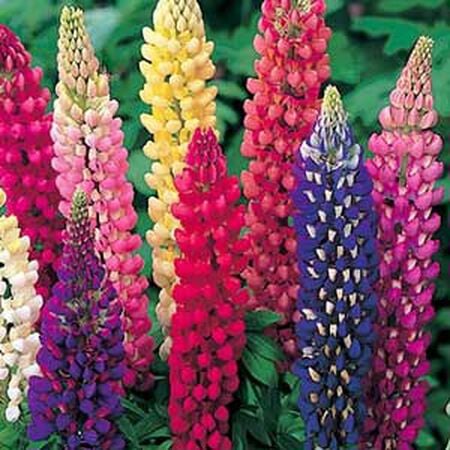Russel Mix, Lupine Seeds
Key Attributes
Key Attributes
Product Details
Weight
0.008Depth
0.1Height
4.5Width
3.25Plant Height
18-36"Botanical Name
Lupinus polyphyllusSeed Type
SeedAdditional Characteristics
Attracts Pollinators, Attracts Birds, Deer ResistantSeeds Per Gram
50Seeds Per Pound
22,800Packet
50 SeedsSow Depth
1/4"Seeds Per Ounce
1,425Breed
Open-pollinatedSun
Full SunGrowing Conditions
Container FriendlyUses
Cut FlowersLife Cycle
PerennialSow Method
TransplantCategories
FlowersDays To Maturity (# Days)
365Components
Growing Instructions
![]() Learning Download: How to Grow Lupine
Learning Download: How to Grow Lupine
Lupine is a spiky, vibrant flower reaching up to 4 feet in height. Lupines can be both annual and perennials. Lupines are frequently seen growing wild throughout the United States, where they serve as a host plant for larvae of endangered butterflies.
Before Planting: Scratch the surface of the seed or soak it overnight in lukewarm water to soften the seed coat. Seeds should be chilled for a week prior to planting.
Planting: Sow directly outdoors, dig the soil up as deep as 20 inches and break it up before raking the area smooth. Plant seeds 1/8 inch deep and 12 inches apart.
Watering: Water one inch per week early in the morning.
Fertilizer: Fertilize Lupine with a fertilizer that is hight in phosphorous, as it encourages the plant to produce more blooms.
Days to Maturity: Lupines will bloom beginning in the early spring and continue blooming through July.
Harvesting: Cut the flowers in the morning or early evening. Cut the stem at an angle with a sharp knife and cut longer than you think you need. Place in a vase filled with warm water immediately after cutting.
Tips: Lupines will add nitrogen to the soil, so you might opt to plant shade-loving plants beneath the lupine as a ground cover, where they will benefit from the nitrogen-rich soil.
Shipping Schedule
Our Seed Promise
 "Agriculture and seeds" provide the basis upon which our lives depend. We must protect this foundation as a safe and genetically stable source for future generations. For the benefit of all farmers, gardeners and consumers who want an alternative, we pledge that we do not knowingly buy or sell genetically engineered seeds or plants.
"Agriculture and seeds" provide the basis upon which our lives depend. We must protect this foundation as a safe and genetically stable source for future generations. For the benefit of all farmers, gardeners and consumers who want an alternative, we pledge that we do not knowingly buy or sell genetically engineered seeds or plants.
The mechanical transfer of genetic material outside of natural reproductive methods and between genera, families or kingdoms, poses great biological risks as well as economic, political, and cultural threats. We feel that genetically engineered varieties have been insufficiently tested prior to public release. More research and testing is necessary to further assess the potential risks of genetically engineered seeds. Further, we wish to support agricultural progress that leads to healthier soils, to genetically diverse agricultural ecosystems, and ultimately to healthy people and communities.
To learn more about the "Safe Seed Pledge" please visit www.councilforresponsiblegenetics.org.

